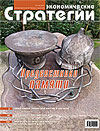Networks as Non-Hierarchical and Non-Market Structures: Realization in Biological and Social Systems
Over the past decades, more and more importance in the social and political spheres is acquired by network structures, propagating in different countries and regions of the world and in different spheres of society. In particular, they form the basis of civil society as a “set of civilizational structures and forms, incarnated in … the functions and actions of individuals, social groups, associations, unions”, which are capable in the interests of ordinary citizens to exercise democratic “control … of the state bodies functioning”, that is, of public persons activities. This article focuses on the organizational principles of network structures and exercises biopolitical approach, according to which the structures of human society and biological system are compared. The term “network structures” has at least two different interpretations in the literature, which can be conditionally called its broad and narrow interpretation.


